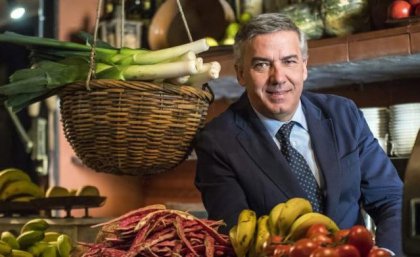
A leading advocate of the Mediterranean diet will discuss challenges for the diet’s uptake amongst millennials at the University of Queensland-hosted TropAg conference.
President of the International Foundation of the Mediterranean Diet Professor Lluis Serra-Majem will speak at the event in Brisbane in November.
“Young people in the Mediterranean region have been eating more processed, Western-style foods and meat than older generations,” said Professor Serra-Majem, also of the University of Las Palmas de Gran Canaria.
However, he said current wholefood and plant-based eating trends becoming increasingly popular with young people mirrored the foundations of the Mediterranean diet, which is regarded as the healthiest and most sustainable dietary pattern in the world.
“People in the Mediterranean region are increasingly recognising that their food heritage has been accumulated over millennia, passed down from generation to generation, and that it is an intangible pillar of their identity,” he said.
The Mediterranean diet promotes eating vegetables, fruits, nuts, seeds, legumes, potatoes, whole grains, breads, herbs, spices, fish, seafood and extra virgin olive oil. Poultry, eggs, cheese and yogurt are eaten in moderation, while red meat is rarely eaten.
Professor Serra-Majem, who has been a consumer of the Mediterranean diet since he was “in the belly of my mother”, began researching the diet in the late 1980s.
“I was analysing the trends in fat intake in Mediterranean countries, and became extremely worried about how ‘fat restrictions’ endorsed by World Health Organisation and other organisations could be harmful for the Mediterranean diet with its olive oil,” Professor Serra-Majem said.
“The science behind the diet is now very strong, with large cohort studies and randomised clinical trials, like the Predimed and the Predimed Plus studies.”
He said the diet’s major health benefits were greater protection against cardiovascular diseases, obesity, diabetes, and cancer (particularly breast and colon cancer), cognitive decline, depression, allergic and respiratory diseases, and bone diseases.
Professor Serra-Majem said the International Foundation of Mediterranean Diet was working with International agencies to include the Mediterranean diet in their agendas.
He said research conducted in Australia and Asia supported the benefits of the Mediterranean Diet.
“We are aiming to construct a worldwide scenario where environment and culture should be considered strong determinants of the sustainability of the Mediterranean diet,” he said.
“Australia is a big continent with a Mediterranean climate in some parts, and a population increasingly interested in the health benefits of diet, while in China everything is possible,” Professor Serra-Majem said.
He said the Mediterranean diet had a lower carbon footprint than a Western diet, which could be an important factor for climate change mitigation.
Professor Serra-Majem will be a guest speaker at the international TropAg tropical agriculture and food conference to be held in Brisbane on 20-22 November 2017, and will also present at a University of Queensland Global Leadership Series Seminar on 22 November.
Media: Professor Lluis Serra-Majem, lluis.serra@ulpgc.es; A/Prof Eugeni Roura, QAAFI Centre for Food and Nutrition Sciences, +61 7 336 52526; Margaret Puls, QAAFI Communications, m.puls@uq.edu.au, +61 7 3346 0553, +61 (0) 409 578 356.
.jpg)



